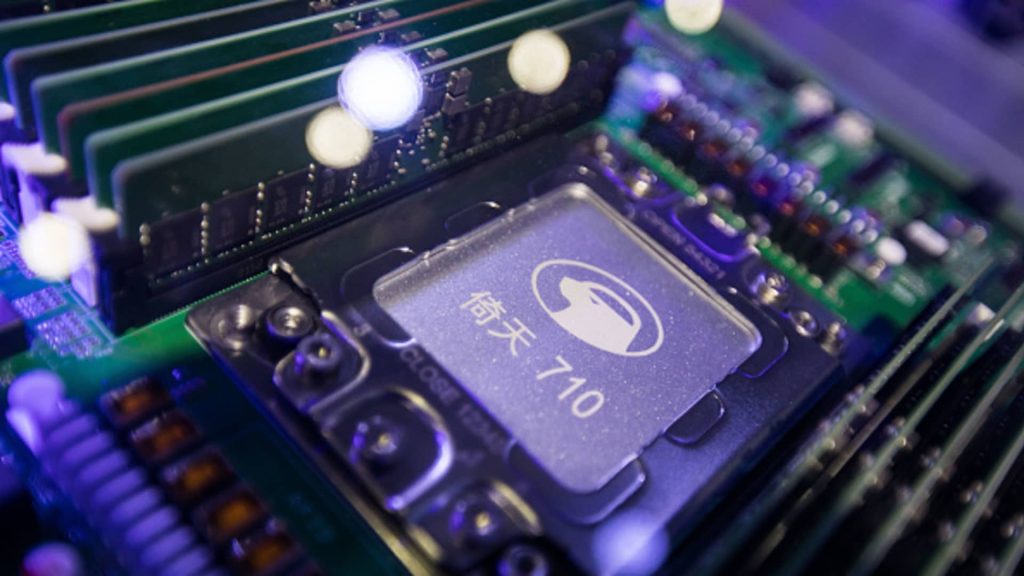BEIJING — After helping shape the early years of Chinese e-commerce, followed by years of management missteps , Alibaba is betting big on artificial intelligence as it takes on a new era. This month, Alibaba led a roughly $100 million investment round in humanoid startup X Square Robot , and put $60 million into the startup behind AI video generation app PixVerse. The tech giant also announced a strategic AI partnership with smartphone company Honor. Since Nov. 2022 — just as OpenAI launched ChatGPT for consumers — Alibaba has joined deals worth more than $3.3 billion, ranging from AI model startups Moonshot and MiniMax to robotics startup Limx Dynamics, according to CNBC analysis of PitchBook data. The Hangzhou-based company is also investing heavily in-house. In February, it announced plans to spend 380 billion yuan ($53.42 billion) in AI and cloud infrastructure over the next three years. More than 100 billion yuan has already gone into AI infrastructure and research in the past year, said Wei Sun, principal analyst at Counterpoint Research. “Alibaba is positioning itself as China’s most aggressive AI investor,” said Sun. “This level of spending is unprecedented among private Chinese firms and rivals the capex trajectories of U.S. tech titans.” Alibaba could join a handful of U.S. companies and reach a $1 trillion market capitalization in five years, up from less than $400 billion today, said Matthew Peterson, managing partner at Peterson Capital Management. Investors have cheered. The company’s U.S.-traded shares have surged by more than 90% year-to-date. The latest gains came after Alibaba secured a major Chinese telecommunications customer for its AI chips through its cloud computing unit. “[Alibaba’s investment in AI is] a massive commitment that’s already yielding tangible returns,” Sun added, referring to recent financial statements and stock gains. In the latest quarter, Alibaba’s cloud computing services saw revenue surge by 26% to 33.4 billion yuan , driven by increased demand for running AI models. It’s a comeback after Alibaba scrapped plans to list the cloud unit in November 2023, citing uncertainties over U.S. export controls on AI chips to China, while making several cloud-related management changes. “It’s a sea change,” said Duncan Clark, an early advisor to Alibaba and now chairman of Beijing-based investment advisor BDA, adding that, “I feel like the company has sharpened its execution and much clearer focus.” “Their key competitive edge is they have massive amounts of data and also the cloud side of things,” he said. “The combination of those things puts them in a very strong position… to reinvent their businesses using AI.” BABA YTD mountain Alibaba shares have been on a tear. Alibaba has also launched its own AI models and tools for generating text and videos, which ranked among the top 10 on the open-source platform Hugging Face. Alibaba also plans to take on Meta with its AI-powered glasses . “Chips, AI, cloud, they’re not really priced in,” said Peterson Capital’s Peterson. One of his funds — with nearly $40 million in assets under management — started investing in Alibaba’s U.S.-traded shares three years ago, which now accounts for nearly 20% of its portfolio. The spending is “absolutely rational …it’s a very expensive sector they’re working in, but they need to be one of the top players,” Peterson said. Pivot to tech The shift marks a pivot from the company’s roots in online shopping, where it has lost ground to rivals such as Pinduoduo and Douyin, especially in e-commerce livestreams. This year, it joined rivals JD.com and Meituan in a subsidy battle for on-demand delivery. Earlier this month, Alibaba also announced its “Amap” navigation app would start ranking local businesses , taking on Meituan’s popular directory of restaurants, shops and tourist sites. But e-commerce is just the icing on the cake — Alibaba has been far busier on AI, data, fintech and cloud. “The e-commerce story is just giving them cash flow so they can pursue all these opportunities in the high-tech space,” Peterson said. Counterpoint’s Sun also noted in an email that a strategy of integrating AI models, robots and chips “positions Alibaba as a unique hybrid of Google [AI & chips] + Amazon [services & e-commerce].” The company is “arguably China’s strongest private-sector contender in the global AI arms race,” she said. There are also political considerations, which strike a raw nerve for Alibaba since it became the poster child for China’s crackdown on internet tech companies, receiving a record $2.8 billion fine for alleged monopolistic behavior in 2021. Given recent government scrutiny on excessive competition, big subsidies for delivery services are more of a concern than spending heavily on tech investments, BDA’s Clark noted. In contrast to the company’s roots as a sales company, now “Alibaba is much more of a core technology company than it once was,” Clark said. “That’s also reflected in the management, the competence of the management in that area, rather than sales.“ “That’s exactly where you need to be with the government in its current stance with the U.S.,” Clark said. “There’s the sense that it’s become a national player.” — CNBC’s Victoria Yeo contributed to this report.
Once an e-commerce giant, Alibaba bets future on billion-dollar AI overhaul
Previous ArticleBank of America to pay $5M in securities manipulation case
Next Article Best Vanguard ETFs
Related Posts
Add A Comment
About Us
Our finance blog is your go-to resource for expert financial advice, covering everything from personal budgeting and saving strategies to smart investing and market analysis. Stay updated with the latest trends, tips, and insights to help you make informed decisions and achieve financial success.
Subscribe to Updates
Subscribe to Get the Latest Financial Tips and Insights Delivered to Your Inbox!
© 2026 Budgetsmart.ai – All rights reserved.

